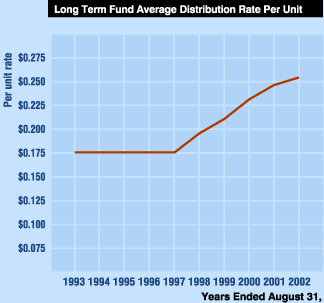Investment Return
The LTF posted a negative investment return of 7.0% (net of investment management fees) for the year ended August 31, 2002. Beginning with the purchase of General Endowment Fund (GEF) units on March 1, 2001, the LTF no longer invests in individual securities except for the GEF units and a negligible amount of cash. Therefore, the LTF's investment return is dependent on the GEF return. The GEF invests in a broad mix of investments and is actively managed to the Endowment Policy Portfolio. The GEF's performance results are available in the GEF section of this report.
Expenses
Since March 1, 2001, beginning with the LTF's investment in the GEF, the LTF incurs only a UTIMCO management fee and other operating expenses directly attributed to its separate management costs. Additionally, beginning in 2002, the LTF is assessed an annual administrative fee on behalf of UT System components for the support of enhanced and expanded endowment compliance. Investment management and consulting fees from external managers, custodial fees, and other operating expenses are paid by the GEF. The LTF's expense ratio which includes its share of the GEF's expenses is presented in the chart below:

Click to print charts in this section using PDF format
Distributions
Consistent with the spending policy for the Endowment Policy Portfolio, the long-term target distribution rate for the LTF is 4.5% of the LTF's net asset value. Distributions are increased annually at the average rate of inflation provided that the distribution rate remains within a range of 3.5% to 5.5% of LTF net asset value. UTIMCO smoothes annual spending by calculating LTF net asset value for distribution purposes as the average value for the trailing twelve quarters. As of August 31, 2002, the distribution rate was 4.4% of the twelve-quarter average.
The LTF's average annual distribution rate per unit was increased by 2.4%, approximately
the average rate of inflation, during the year ended August 31, 2002. This equated
to an increase in the 2002 rate to $0.251 per unit from the 2001 rate of $0.245
per unit. The fiscal 2002 distributions, at $0.251 per unit, represented 4.9%
of the LTF's five-quarter average net asset value during the year.

Click to print charts in this section using PDF format
Preservation of Purchasing Power
Preserving the LTF's purchasing power over time is dependent on the LTF's ability to meet its distribution policy objectives.
LTF distribution policy objectives are to:
- Provide a predictable, stable stream of distributions over time
For the preceding five-year period, starting with the fiscal year ended August 31, 1998, the rate of increase in the LTF's distribution rate per unit was 11.4%, 7.7%, 9.5%, 6.5% and 2.4%.
- Ensure that the inflation adjusted value of distributions is maintained over the long-term
The LTF distribution rate per unit was unchanged from the period August 31, 1992, through August 31, 1997. The level of distributions was held constant in order to ensure long term financial equilibrium and to bring the LTF's distribution rate to within the average of other colleges and universities. The LTF's distribution rate per unit increased from $0.175 to $0.251 per unit or by 43% on a nominal basis and by 31% on an inflation-adjusted basis over the five-year period ended August 31, 2002.
- Ensure that the inflation adjusted value of LTF assets after distributions is maintained over the long-term
The past two fiscal years have produced negative total return and the LTF has not been able to maintain purchasing power over the five-year period as well as the one-year period. However, the LTF's distribution rate was controlled in previous years when the LTF experienced above average asset growth during periods of low inflation. As a result, the LTF's net assets have increased in purchasing power 1.93% for the ten-year period ended August 31, 2002.
next >>

